Learn about Quantum Computers
Discover the fundamentals of quantum computing and its transformative potential
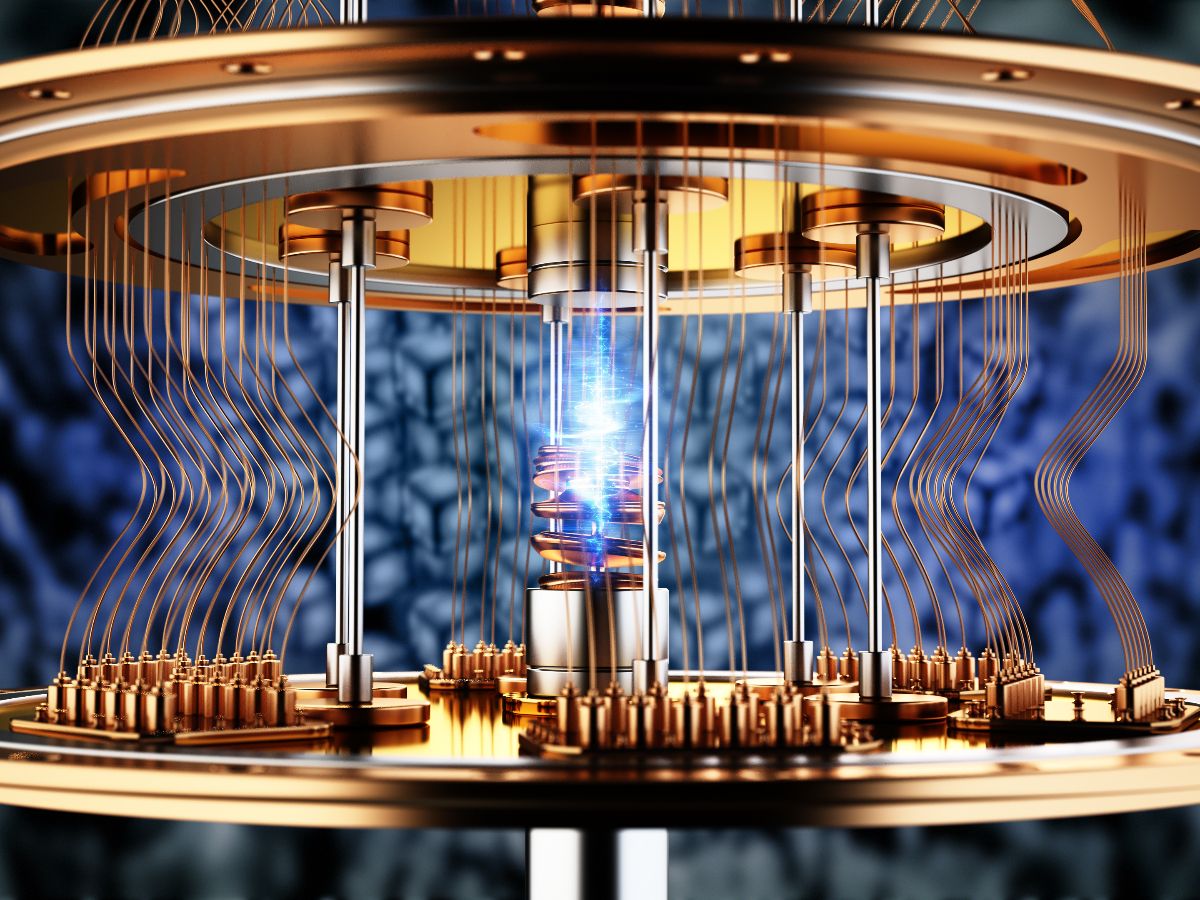
Frequently Asked Question about Quantum Computers
Quantum computers are a revolutionary step beyond classical computers. Unlike traditional machines that process data as binary bits (0s and 1s), quantum computers use qubits, which can exist in multiple states simultaneously thanks to superposition. This allows them to perform complex calculations at unimaginable speeds.
Key Features:
- Superposition: Think of a light switch that can be both on and off at the same time.
- Entanglement: Qubits can be linked, so the state of one instantly influences the other, no matter the distance.
- Exponential Power: A 100-qubit quantum computer can outperform the most powerful supercomputer in certain tasks.
Imagine solving problems in seconds that would take classical computers centuries. Quantum computers are the engine of tomorrow’s breakthroughs.
Quantum computers aren’t just powerful—they’re transformative. They promise to solve humanity’s toughest challenges and unlock new frontiers in technology, science, and business.
Here’s why you should care:
- Medicine & Healthcare: Accelerated drug discovery and personalized treatments.
- Climate Change: Precise climate modeling and development of sustainable materials.
- Cybersecurity: Next-generation encryption that’s nearly impossible to crack.
- Artificial Intelligence: Faster, smarter, and more intuitive AI systems.
We’re at the dawn of a quantum revolution, and its impact will ripple through every aspect of modern life. Understanding this technology means staying ahead of the curve.
Here’s a quick snapshot of the quantum landscape:
- Leaders in the Field: Companies like Google, IBM, Rigetti, and D-Wave are pioneering quantum innovation.
- Recent Breakthroughs: In 2023, scientists achieved a 99.998% fidelity quantum entanglement—pushing closer to fault-tolerant quantum computing.
- Practical Uses Today: Quantum computers are already being used in material science and financial modeling.
- Challenges: Quantum computing is still in its early stages, with hurdles like qubit stability and scaling.
You don’t need to be an expert, but staying informed about quantum’s trajectory ensures you’re part of the conversation shaping the future.
Quantum computing may feel distant, but its influence will touch your life sooner than you think:
- Everyday Tech: Smarter algorithms powering your apps, recommendations, and online experiences.
- Healthcare Advances: Quantum simulations could revolutionize diagnostics and treatments for diseases like cancer.
- Supply Chain Optimization: Shorter delivery times and reduced costs for goods you buy.
- Energy Solutions: Innovations in battery technology and clean energy development.
While it may not replace your laptop anytime soon, quantum computing will transform the systems that shape our world—from industries to personal technology.
Let’s explore the journey so far and where we’re headed:
- 1981: Richard Feynman introduces the idea of quantum computers.
- 1994: Shor’s Algorithm shows quantum computers can break classical encryption.
- 2019: Google achieves “quantum supremacy” with a calculation in 200 seconds that would take 10,000 years on a supercomputer.
- 2023-2024: Record-breaking achievements in quantum entanglement and error correction.
What’s next? Experts predict we’ll see practical applications of quantum computing by 2030, with industries like AI, healthcare, and finance leading the charge. The race is on, and the future is quantum.
Classical Computer versus Quantum Computer
Classical computers process information using bits, which represent data as either 0 or 1. In contrast, quantum computers use qubits, which can exist as 0, 1, or both simultaneously thanks to quantum superposition. This allows quantum computers to perform complex calculations exponentially faster for specific problems, such as cryptography or molecular simulation. Quantum entanglement further enhances their computational power by enabling qubits to share information instantaneously.
“Nature isn’t classical, dammit, and if you want to make a simulation of nature, you’d better make it quantum mechanical.”
Physicist Richard Feynman
Spooky science
Quantum computers sit at the edge of reality and fiction, where the rules of the universe blur into something almost magical. They harness the bizarre, “spooky” phenomena of quantum mechanics—particles existing in multiple states at once and influencing each other across vast distances. These machines can solve problems that defy classical computation, making them feel like science fiction brought to life. Yet, their potential remains just out of reach, a tantalizing glimpse into a future that feels both impossible and inevitable. In the realm of quantum, the line between what is and what could be is razor-thin.
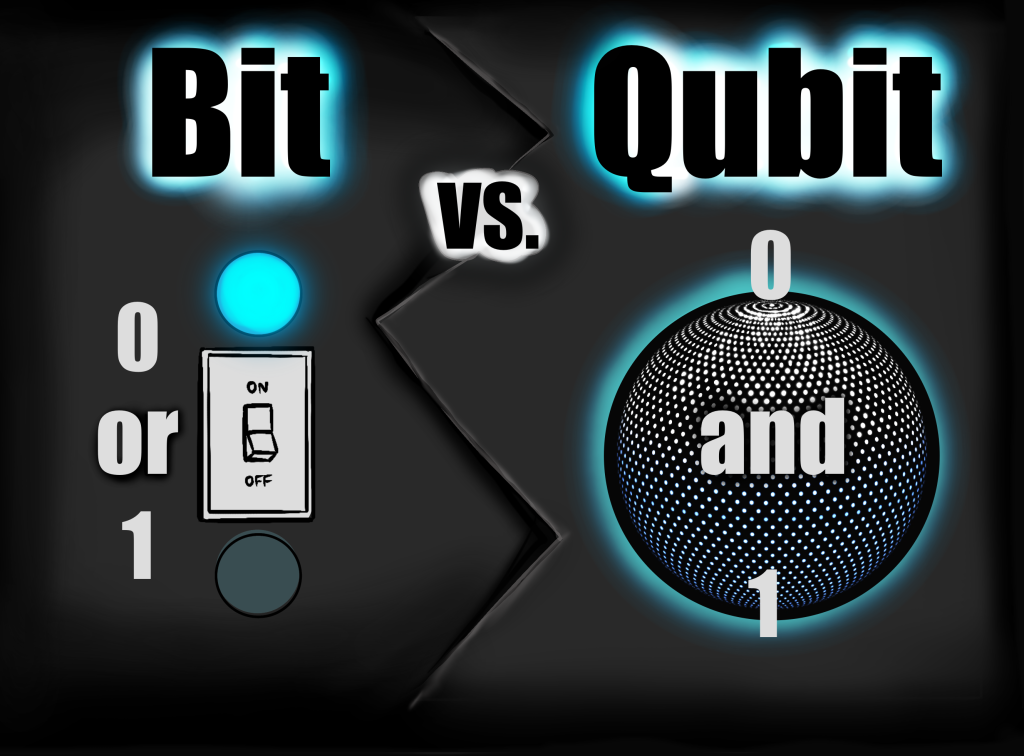
What powers quantum computers?
Quantum computers are powered by technologies and systems capable of creating and manipulating quantum bits (qubits). The primary types of quantum computers include:
1. Photonic Quantum Computers: Use photons (particles of light) to encode and process quantum information. They are highly efficient for certain types of computations, especially those requiring long-distance communication.
2. Superconducting Quantum Computers: Utilize circuits made of superconducting materials cooled to near absolute zero. These systems enable the rapid manipulation of qubits with high precision and are used by companies like IBM and Google.
3. Trapped Ion Quantum Computers: Use charged atoms (ions) trapped in electromagnetic fields. Lasers manipulate these ions to perform quantum computations with high stability and accuracy.
4. Silicon Quantum Computers: Use silicon-based technologies to create qubits, similar to classical semiconductor chips, making them scalable and compatible with existing fabrication methods.
"The mathematical framework of quantum theory has passed countless successful tests and is now universally accepted as a consistent and accurate description of all atomic phenomena".Erwin Schrödinger
Key Atoms in Quantum Computing:
Atoms like rubidium, cesium, ytterbium, and strontium are commonly used because of their specific energy levels and quantum properties. These atoms enable the creation and manipulation of qubits due to their ability to maintain coherence and interact predictably in quantum systems.
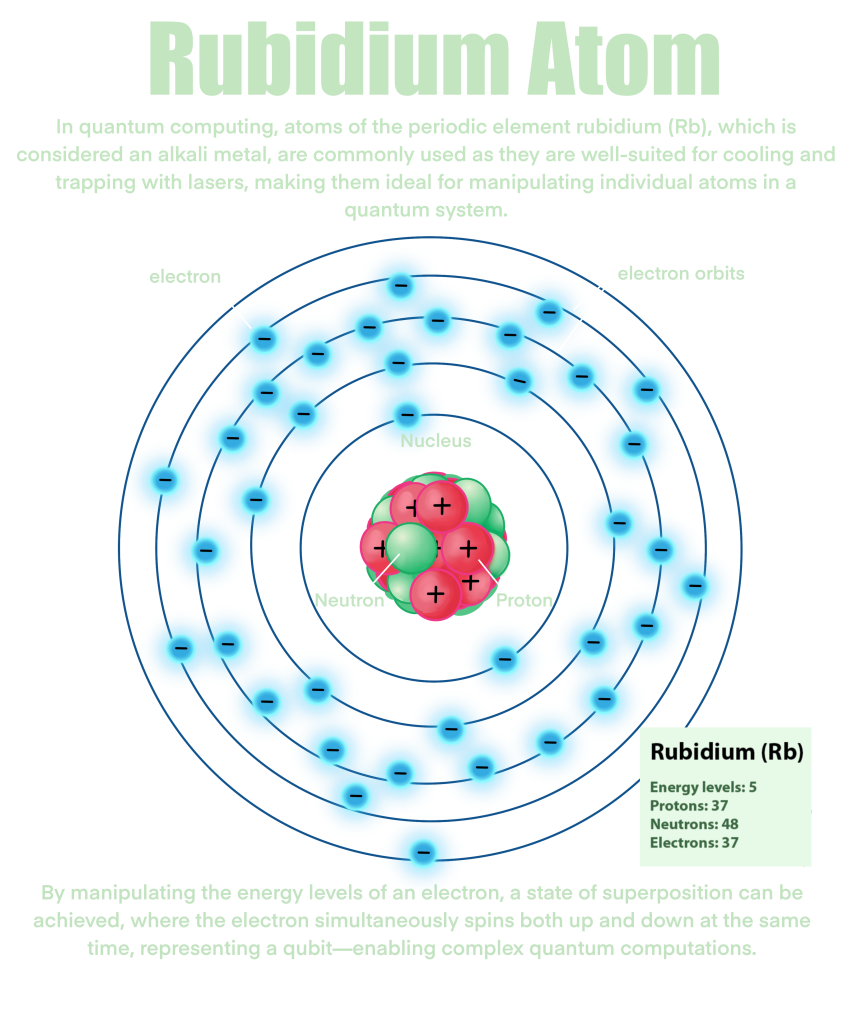
Schrödinger's cat
Schrödinger’s Cat is a famous thought experiment that highlights quantum superposition—the strange idea that a system can exist in multiple states at once. In this scenario, a cat is sealed in a box with a radioactive atom, poison, and a detector. Until observed, the atom is in a superposition of decayed and not decayed, meaning the cat is both alive and dead. This “spooky” state defies common sense, yet it perfectly illustrates quantum uncertainty.
“The task is ... not so much to see what no one has yet seen; but to think what nobody has yet thought, about that which everybody sees.”
Erwin Schrödinger
How Quantum Computers Use it
Quantum computers use this principle to process information. Just as the cat is simultaneously alive and dead until observed, quantum bits (qubits) can exist as 0, 1, or both at once. This enables quantum computers to evaluate multiple possibilities simultaneously, making them extraordinarily powerful for complex decision-making, such as optimizing supply chains or simulating molecular interactions. Schrödinger’s paradox isn’t just a puzzle—it’s the foundation for how quantum machines redefine computation.
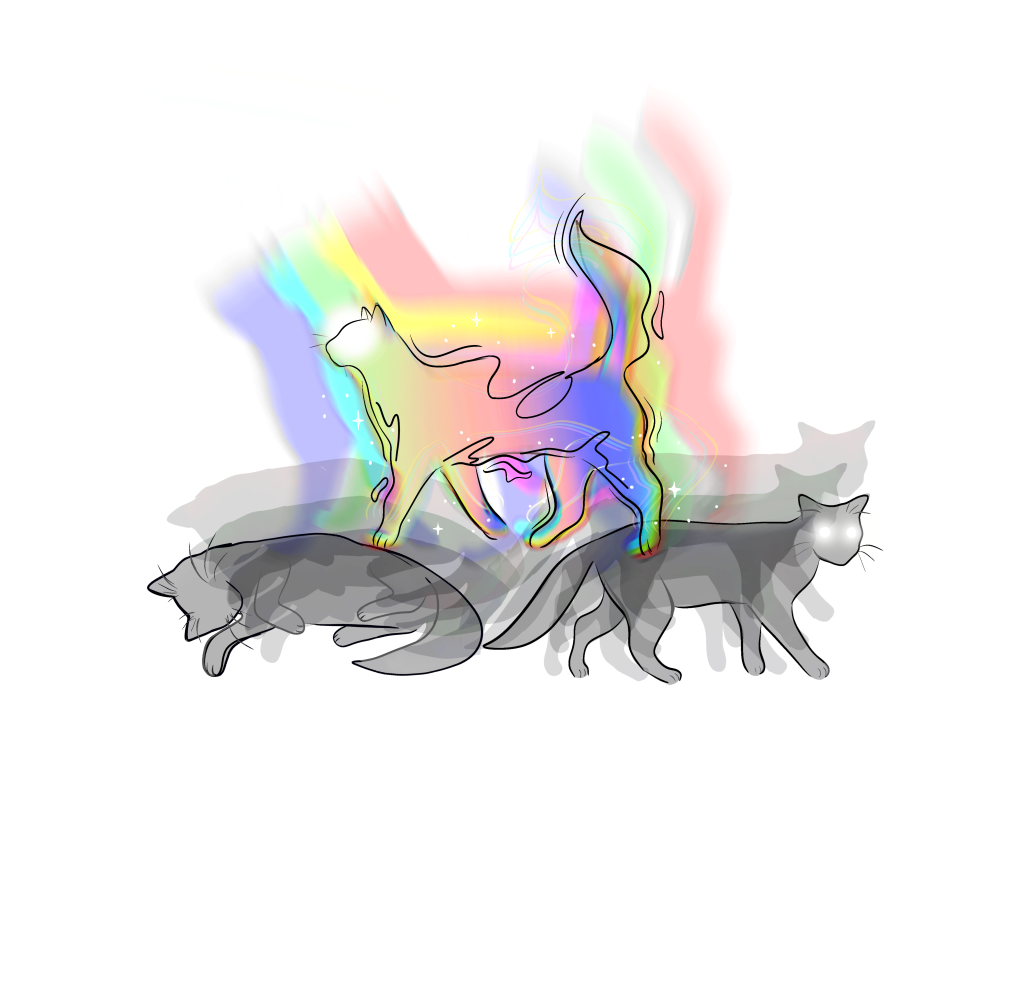
Quantum Entanglement
Quantum entanglement is one of the most mysterious phenomena in physics, where two particles become so interconnected that the state of one instantly determines the state of the other, no matter the distance between them. It defies classical understanding of cause and effect, suggesting an invisible thread linking entangled particles across space. Albert Einstein famously called this “spooky action at a distance,” highlighting its counterintuitive nature.
“By 2100, our destiny is to become like the gods we once worshipped and feared. But our tools will not be magic wands and potions but the science of computers, nanotechnology, artificial intelligence, biotechnology, and most of all, the quantum theory.”
Michio Kaku
How Quantum Computers Use it
Quantum computers leverage entanglement to enhance computational power. When qubits are entangled, changing the state of one affects its counterparts instantly, creating a network of interconnected data. This enables quantum systems to process complex, interconnected computations in parallel, drastically outperforming classical computers in fields like cryptography, optimization, and material science. Entanglement isn’t just “spooky”—it’s the secret sauce powering the quantum revolution.
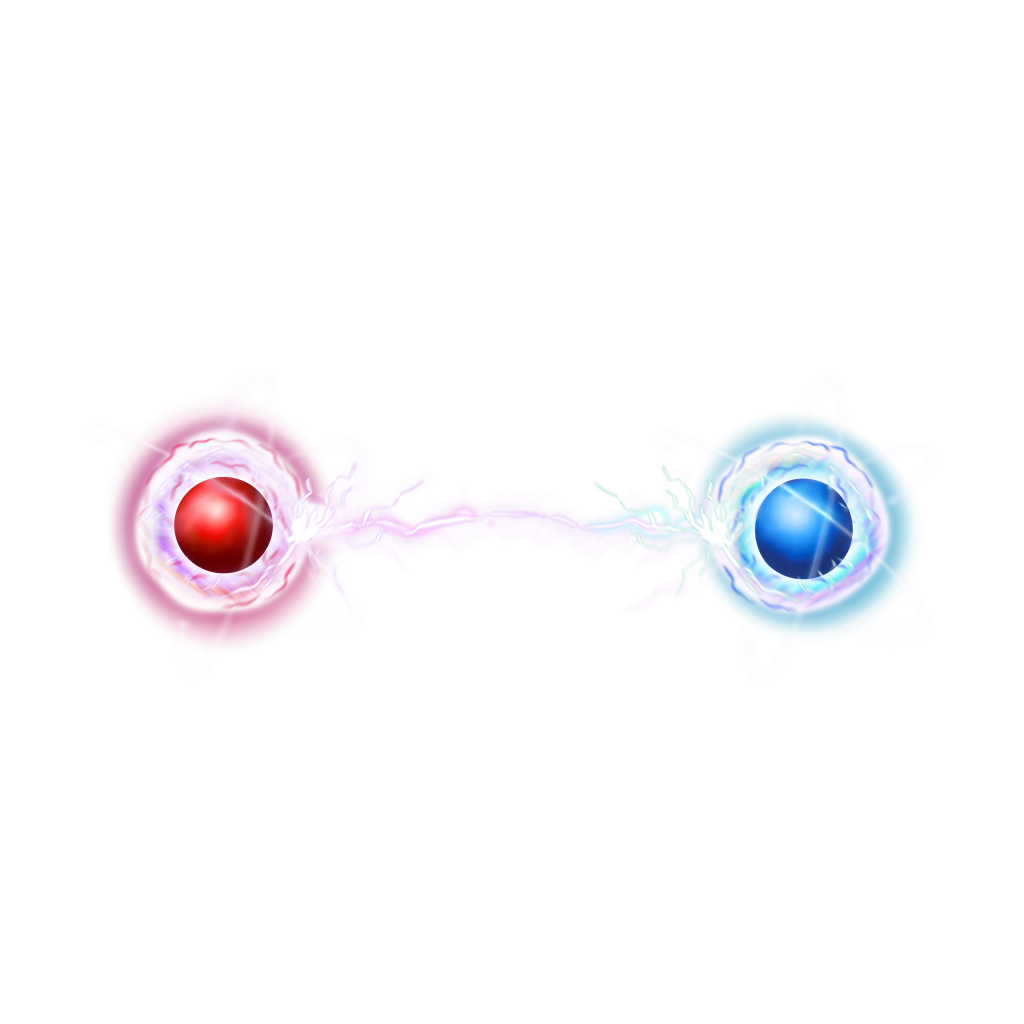
Decoherence & Interference
Decoherence and interference are fundamental challenges in quantum computing. Decoherence occurs when qubits interact with their environment, causing them to lose their quantum state. This “noise” disrupts the fragile quantum properties, like superposition and entanglement, making computations unreliable. It’s a major hurdle in building stable, error-free quantum computers.
"A classical computation is like a solo voice—one line of pure tones succeeding each other. A quantum computation is like a symphony—many lines of tones interfering with one another."
Seth Lloyd
Interference
Interference, on the other hand, is a quantum property that quantum computers harness to solve problems. By carefully manipulating wave-like quantum states, constructive interference amplifies the right solutions, while deconstructive interference cancels out two out-of-phase waves, resulting in a flat wave. This reduces the likelihood of an incorrect output.
Balancing interference while combating decoherence is key to quantum computation.
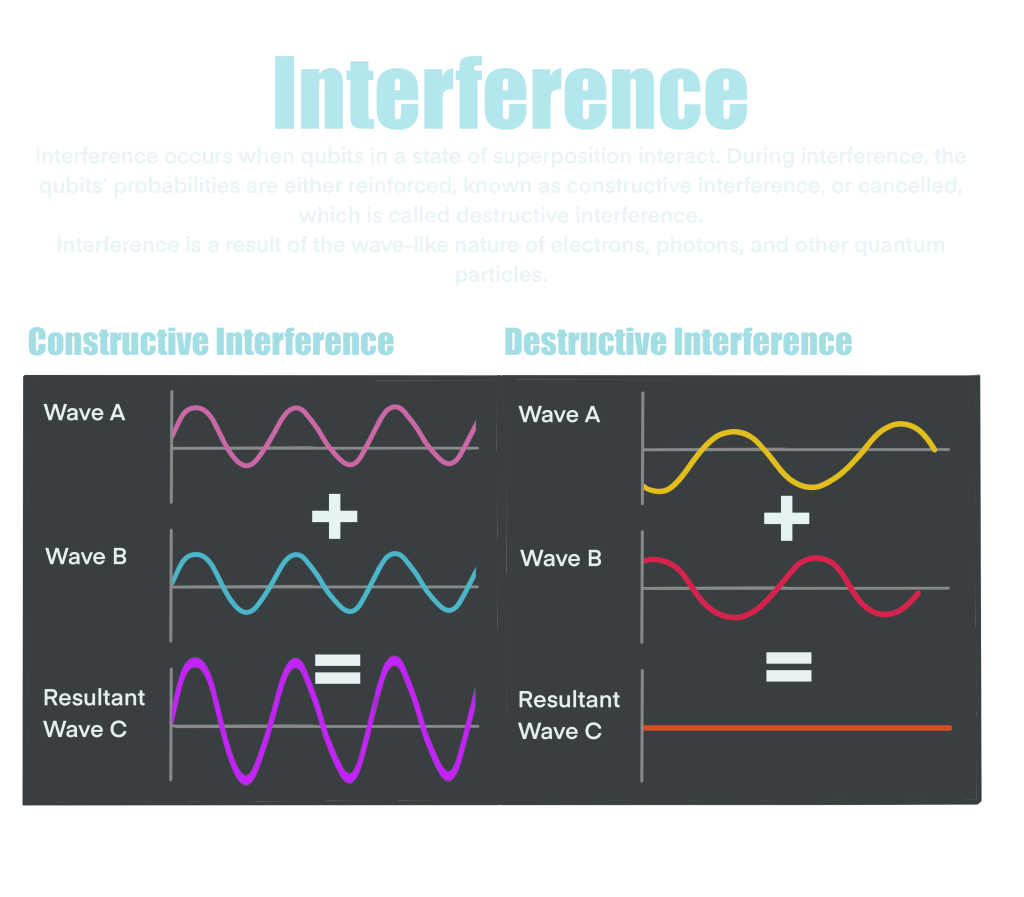
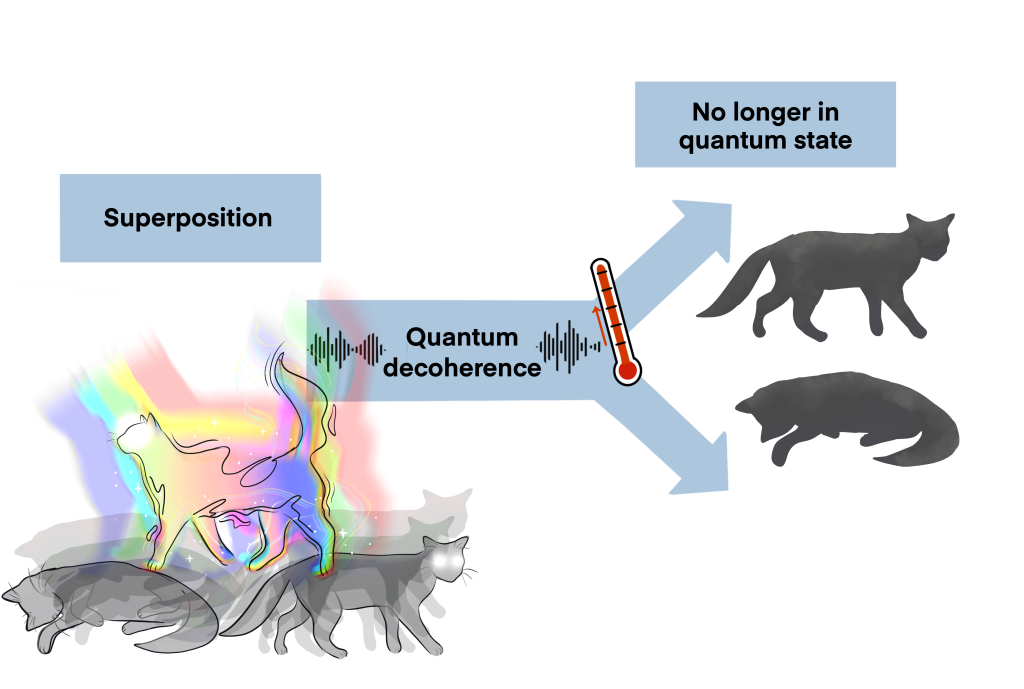
Observation as the cornerstone
Observation is a cornerstone of quantum mechanics, tying phenomena like superposition, entanglement, decoherence, and interference together. When a quantum system is observed, its wave function “collapses,” forcing it to adopt a specific state. This act of measurement determines the outcome and shifts the system from its probabilistic quantum nature to a definite classical state.
"The more you study quantum mechanics, the more crazy and incomprehensible it becomes"
Blake Couch
Observation in quantum computing
In quantum computing, observation is crucial yet delicate. Interference allows qubits to explore multiple possibilities, but decoherence (interaction with the environment) can mimic unwanted observation, collapsing states prematurely. Precise observation ensures reliable outputs, making it the key to unlocking quantum potential.

So what’s happening in the industry with all this technology? Quantum advances are happening across domains in small and large leaps.
Quantum breakthroughs don’t require massive data centers—they can emerge in compact, specialized forms that redefine what’s possible. From portable quantum sensors to secure communication devices, the future of quantum is as versatile as it is revolutionary
Design better drugs and materials
The immense power of quantum computers could break traditional encryption, making the race for quantum-safe security urgent.
From artificial photosynthesis to converting CO2 to methanol, the possibilities in research are endless.
Quantum computers could revolutionize finance and banking by optimizing portfolios, detecting fraud, and transforming risk analysis, making their adoption a race for competitive advantage.


A revolution of supply chain and logistics by solving complex optimization problems in real time, enabling faster, more efficient global operations.
Transform communication with unbreakable encryption and ultra-secure quantum networks, redefining how information is transmitted and protected.
The quantum internet will revolutionize connectivity with ultra-secure, instantaneous communication powered by entangled particles, redefining the very fabric of digital interactions.
The truth and reality is we don't know both of the potential and harm of this new quantum reality. It's our responsibility to educate and inform ourselves.
We don’t have to fully understand quantum computers to benefit from them.
We don’t need to fully understand quantum mechanics or quantum computers to reap their benefits. From your phone, light bulb and GPS, you’re already using quantum every day. From life-saving drug discoveries powered by quantum simulations to ultra-secure financial transactions and seamless global logistics, its impact will touch our lives in countless ways. Whether directly or through the industries that shape our world, quantum will transform the everyday.

Grab a beverage and enjoy these recommended videos to learn about quantum computers
Hungry for more? Watch these videos to dive deeper into the fascinating world of quantum mechanics and its real-world applications. Explore how quantum principles power navigation, communication, and technology, and discover the breakthroughs shaping the quantum future.


